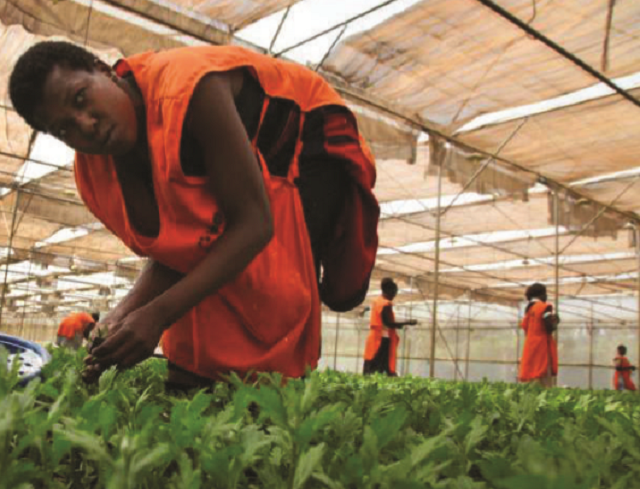
Royal Van Zanten chemical poisoning common, say workers’ rights groups
“That one flower, for a new girlfriend or a father, a colleague’s birthday or a grandmother, often means more than all the bunches put together. It’s not about the numbers, the colours or sizes. It’s about the love and passion that our breeders bring to this experience.
And that also sums up how we work at Royal Van Zanten. Our strength lies not in our size but in our integrity and dedication to the quality of our products and the way we work with each other – with our customers, our colleagues and with our suppliers.”
Most of the locals working at Royal Van Zanten, the Dutch flower-exporting firm with greenhouses on the edges of Kampala city at Buloba, possibly have never visited the company website to read those promotional words. They are mainly poor, uneducated women, for whom flowers are not sentimental objects but products of their sweat that put food on the table – some times.
Many of them are paid between Shs100,000 (US$27) to Shs200,000 (US$54)as wages for a month. That is about the price of a low-cost bouquet of twenty red roses in the Dutch capital Amsterdam. Yet the wages the workers at the Royal Van Zanten farm have been worse in the past. Two years ago they ranged between Shs60, 000 (US$16) and Shs108, 000 (US$29) per month.
But many of the local workers do not know that. Most of them cannot read. So they also had no way of knowing that, as they went about arranging the flowers, the company was allegedly exposing them to deadly chemicals.
One of the workers is Sharon Nabitaka, a 22-year old woman who is now ailing in hospital after she suffered poisoning at the farm.
Nabitaka had been hospitalised to Ntinda Hospital in Kampala for about a month ago when we visited her on Nov.25.
Covering herself with a traditional shawl-like garment popularly known as leso, she appears to have run out of words to describe her condition. Instead, she does what most women might say is unthinkable – she throws off the shawl to expose her naked stomach and breasts to us – total strangers.
“I cover myself with this leso not because I don’t have clothes but because of my swollen stomach and itching of the skin with any little heat,” she explains, “I don’t cover myself with anything heavy even at night.”
Nabitaka, who has been administered 16 intravenous (IV) drips in the hospital, is one of nine women still hospitalised at Ntinda and Nsambya Hospitals. In total, 122 local workers suffered toxic effects at the farm.
The women are said to have collapsed and rushed to the farm-affiliated clinic called First Care Clinic at nearby Bulenga town. When their condition could not be managed, they were transferred to more specialized hospitals in Kampala.
Dangerous exposure
Jennifer Nassali, the general secretary of the Uganda Horticultural Industrial Services Provider and Allied Workers Union (UHISPAWU), says the women suffered skin and eye irritations, headache, abdominal pain, vomiting, and dizziness after being ordered told to cut flowers from greenhouses that had been fumigated with toxic chemicals less 24 hours earlier.
Neighbours to the Buloba farm say they saw many women being rushed to hospital on motorcycles.
“Things were bad here. Every minute, you could see a motorcycle taking a patient to hospital from this flower farm,” recalls Wilberforce Friday, a boda-boda motor cycle cyclists who lives and operates near the farm, approximately 14 kilomtres west of Kampala.
“People were running out of that gate as if they were mad, falling helpless on the ground.”
“The flower farm violated the safety regulations when they were ordered to work in the greenhouse just few hours after fumigation,” Nassali says, adding that legal action against Royal Van Zanten is being considered.
Polyne Nakabugo, another worker battling skin and eye irritation, vomiting and dizziness says the farm does not give workers protective gears in spite of the hazardous chemicals they are exposed to. They only get gumboots and aprons.
Nakubuga had earlier been discharged from hospital after a few days of admission but re-admitted barely two weeks after. Her condition had worsended.
Dr. Boaz Tumuhairwe, who is treating the women at the hospital told The Independent on Nov 26 that various tests have been done both at the facility and at the Lancet Laboratories in South Africa and all confirm that the patients were poisoned.
“The truth is that all these people were poisoned based on the medical evidence,” he says. “Some were highly exposed to the chemical than others.”
He said it is as a result of the chemical reactions in their bodies that all the patients had severe headaches, abdominal pain, vomiting and nausea, skin infections, and dizziness.
With regard to swollen stomachs, Dr. Tumuhairwe said, all the patients had a lot of gas as a result of the chemical exposure.
He said everything is in control as they to strive to suppress the gas in the patients’ stomach ahead of their discharge from the hospital.
The hospital, however, did not carry out further tests to ascertain the exact chemical components that the women were exposed to even as they claimed to have been sickened by metam sodium, a soil fumigant widely used internationally as an agricultural pesticide.
 The Independent Uganda: You get the Truth we Pay the Price
The Independent Uganda: You get the Truth we Pay the Price


